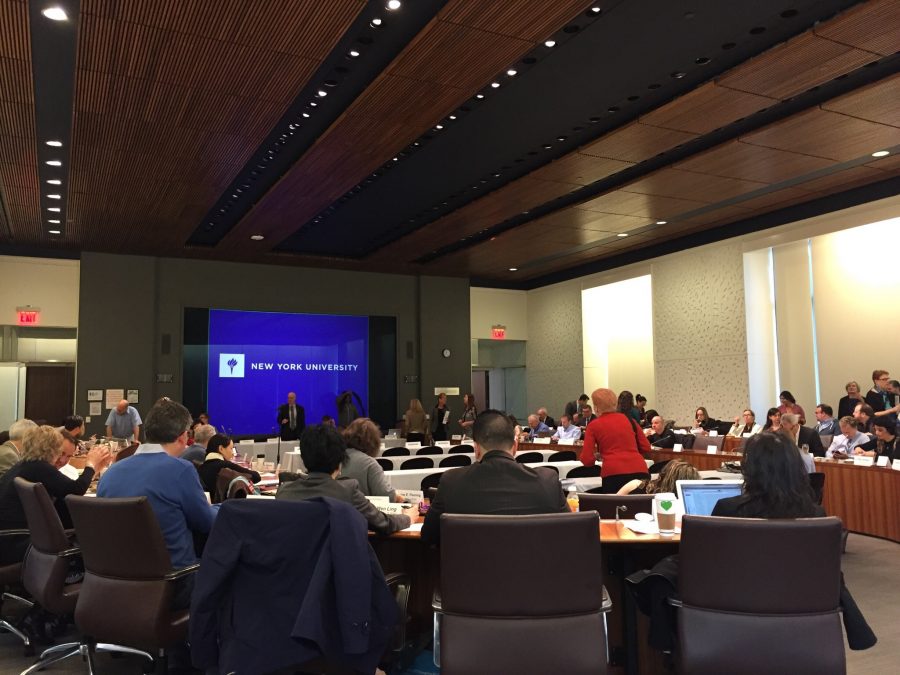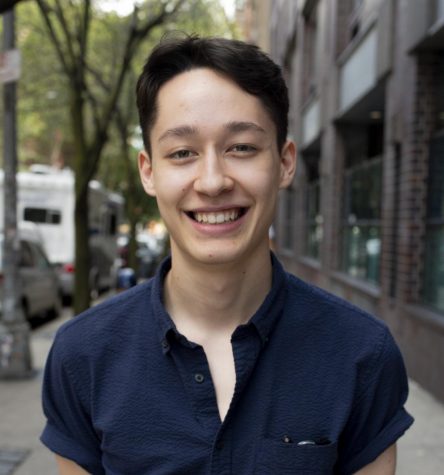University Senate Rundown March 30, 2017
University Senate meetings are held on a monthly basis in the colloquium room. Attendees include members from the Student Senators Council, the Tenured/Tenure Track Faculty Senators Council and the Full-Time Continuing Contract Faculty Senators Council, among others. (WSN File Photo)
March 30, 2017
Each month members from the Student Senators Council, the Tenured/Tenure Track Faculty Senators Council, the Full-Time Continuing Contract Faculty Senators Council, the Administrative Management Council and University officers convene for a two hour University Senate meeting.
Although minutes for University Senate meetings are published, they are not approved until the next time the senate meets — often a month later. Washington Square News sat in on their March 30 meeting, and will continue to cover University Senate meetings as long as its application to attend is accepted. Notes on the meeting, which began with an approval of the Feb. 15 University Senate minutes, are below:
I. Standing Committee Reports
- The Academic Affairs Committee used the bulk of the meeting to discuss, present and vote on a resolution to approve calendars for the next two academic years.
- The calendars were ultimately approved in a simple yea or nay vote by the Senate.
- “Rather than the greatest good for the largest number of people, it has sometimes felt that our goal has been to negatively affect the largest number of people but to the minimum degree possible,” Chair of the committee Ben Stewart said to which the audience laughed.
- The committee only presented calendars for the two upcoming academic years because of scheduling difficulties — specifically with regard to lab classes Tandon students. Nobody expounded on what the exact issues are. The committee will create a working group to discuss a solution, and will present a calendar for the 2020-2021 academic year at the next senate meeting.
- The senate debated the lack of Jewish holidays built into the calendar. President Andrew Hamilton mentioned that NYU does have a policy that allows students to take time off on religious holidays. Others countered saying that the accommodations aren’t enough and often lead to students falling behind.
- “Maybe saying make accommodations isn’t enough,” a professor said. “It would be better for the students if we could observe holidays.”
- “Perhaps there are aspects in our current policy that can make the accommodation more useful to the students,” Hamilton said.
- Senator-at-Large Juan Manuel Calero Canaval noted that the calendar did not reflect an SSC resolution passed last academic year to change the name of fall recess, which falls on Columbus Day, to Indigenous People’s Day.
II. Council Reports
- The Deans Council briefly mentioned that Student Conduct and Community Standards Director Craig Jolley said that changes will be made to the non-academic code of conduct. No one said what would change in the code of conduct.
- Tenured/Tenure Track Faculty Senators Council and Continuing Contract Faculty Senators Council, heard from SLAM members Drew Weber and Husniye Cogur who advocated on behalf of a resolution that would put students on the board of trustees and increase board transparency. SLAM continues to work with the SSC as well.
- The Tenured Faculty Senators Council said it was impressed by the thought put into the resolution to have students on the board of trustees .
- SSC said that it is working on several resolutions including one that would announce NYU as a sanctuary campus and one to put a student on the board of trustees.
III. Information Security Update
- Chief Information Officer Len Peters spoke at length about the state of NYU’s IT security.
- “One of the really challenging things we have on campus right now is compromised accounts — someone accessing your netID and password — and using that info to do a variety of different things,” Peters said. “We have seen direct deposit cheques being redirected.”
- Peters, who joined in October 2016, said that the IT department is currently in the process of asking and answering questions such as how to grade the current state of NYU IT and what’s at stake.
- “We’re taking a risk based approach to security,” Peters said. “We’re taking internal and external reports and risk ranking them.”
- Peters said that there are 257 active IT risks: 6.4 percent high risk, 43.7 percent medium risk and 50 percent low risk. Exploits, flaws in software code that expose it to hackers or malicious software and open ports — devices that can accept packets of information — are examples of high risk problems facing NYU. The IT department’s goal is to reduce the number of risks over time.
IV. Report of the President
- Hamilton announced that Pharrell Williams, who is the commencement speaker this year, will receive a Doctor of Fine Arts degree, honoris causa.
- Former congresswoman Gabrielle Giffords — who survived a 2011 gunshot wound — media figure Melissa Harris-Perry and former head of the Center for Disease Control Thomas Frieden will also be awarded honorary degrees.
Email Sayer Devlin at [email protected].




























































































































































